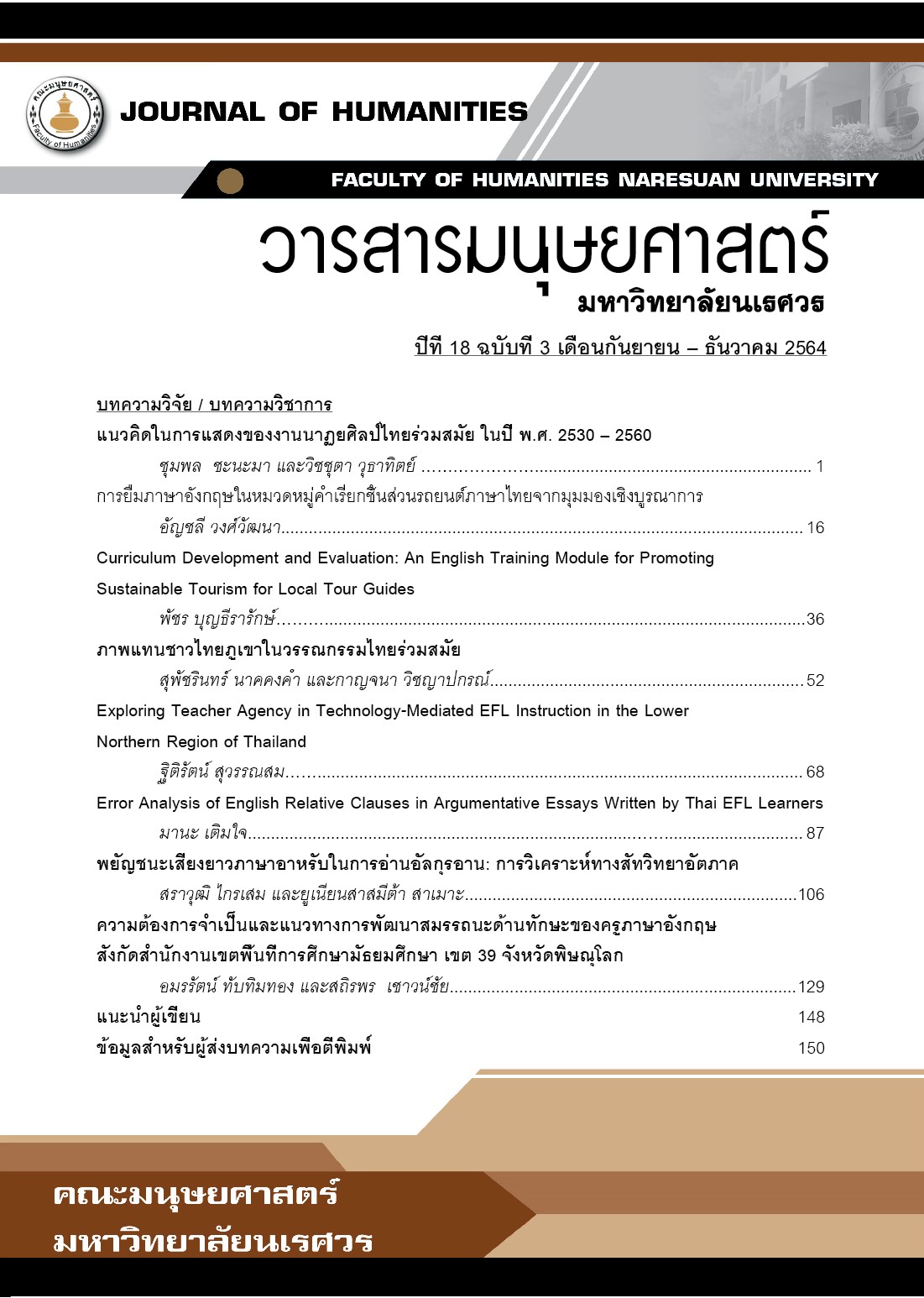การพัฒนาและประเมินหลักสูตรการฝึกอบรมภาษาอังกฤษเพื่อส่งเสริมการท่องเที่ยวแบบยั่งยืนสำหรับผู้นำเที่ยวท้องถิ่น
Main Article Content
บทคัดย่อ
งานวิจัยฉบับนี้มีวัตถุประสงค์เพื่อพัฒนาและประเมินหลักสูตรอบรมภาษาอังกฤษเพื่อส่งเสริมการท่องเที่ยวแบบยั่งยืนสำหรับผู้นำเที่ยวท้องถิ่นในเขตเทศบาลตำบลท่าศาลา จังหวัดเชียงใหม่ ผู้เข้าร่วมวิจัยมีจำนวน 18 คน เครื่องมือการเก็บข้อมูลมีดังต่อไปนี้ แบบฟอร์มการประเมินความเที่ยงตรงเชิงเนื้อหาของหลักสูตร การทดสอบการพูดภาษาอังกฤษก่อนและหลังการอบรม การทดสอบบทบาทสมมุติ ณ สถานที่จริง แบบสอบถามความพึงพอใจของนักท่องเที่ยวต่อการใช้ภาษาอังกฤษของผู้เข้าอบรม และแบบสอบถามความพึงพอใจของผู้เข้าอบรมต่อหลักสูตรการอบรม ผลการวิจัยพบว่าจากจำนวนเกณฑ์ประเมินประสิทธิผลของหลักสูตรที่ตั้งไว้จำนวนห้าข้อมีการบรรลุผลจำนวนสี่ข้อ
Article Details
ข้อความรู้ใด ๆ ตลอดจนข้อคิดเห็นใด ๆ เป็นของผู้เขียนแต่ละท่านโดยเฉพาะ คณะมนุษยศาสตร์ มหาวิทยาลัยนเรศวร และกองบรรณาธิการวารสารมนุษยศาสตร์ฯ ไม่จำเป็นต้องเห็นพ้องด้วย
เอกสารอ้างอิง
Adams, J., Khan, H., & Raeside, R. (2014). Research methods for business and social science students. London: Sage Publishers.
Barnard R., & Zemach, D. (2003). Materials for specific purposes. In B. Tomlinson (Ed.), Developing materials for language teaching. (pp.306-323). London: Continuum.
Bogdan, R. C., & Biklen, S. K. (2007). Qualitative research for education: An introduction to theory and methods. Boston, MA: Pearson.
Boonteerarak, P., & Wongnang, K. (2017). The triangulation in sources and methods: Task-based needs analysis for the development of an English training module for cultural interpreters. Proceedings from the 6th Burapha University International Conference: Creativity, Innovation, and Smart Culture for the Better Society. Pattaya, Thailand: Burapha University.
Goldstein, H. (1987). Multilevel models in educational and social research. New York, NY: Oxford University Press.
Holme, R. (1996). ESP ideas. Essex: Longman.
Hutchinson, T., & Waters, A. (1987). English for specific purposes: A learning-centred approach. Cambridge: Cambridge University Press.
Kanoksilapatham, B. (2016). Promoting global English while forging young northeastern Thai learners’ identity. The Southeast Asian Journal of English Language Studies, 22(3), 127 – 140.
Kelly, A.V. (2009). The Curriculum, theory and practice. Thousand Oaks, CA: Sage Publications.
Larrotta, C., & Serrano, A. (2011). Adult learners’ funds of knowledge: The case of an English class for parents. Journal of Adolescent & Adult Literacy, 55(4), 316–325.
Long, M. (2015). Second language acquisition and task-based language teaching. Malden, MA: Wiley Blackwell.
Nunan, D., (2004). Task-based language teaching. Cambridge: Cambridge University Press.
Office of the National Economic and Social Development Board, Thailand. (2017). The twelfth national economic and social development plan. Bangkok: Office of the Prime Minister.
Richards, J. C., & Rodgers, T. (2001). Approaches and methods in language teaching. (2nd ed.). New York, NY: Cambridge University Press.
The High Impact Tourism Training for Jobs and Income Programme. (2019). Local guide training course trainer guide. Retrieved on June 15, 2019 from https://www.mekongtourism.org/wp-content/uploads/local-guide-trainer-guide-final-EN.pdf.
The Tourism Authority of Thailand. (2015). Annual report. Retrieved on April 20, 2015 from https://www.tourismthailand.org/About-Thailand/About-TAT/TAT-Informative
The Tourism Stream Action Committee of the Globe 90 Conference on Sustainable Development. (1990). An action strategy for sustainable tourism development. Vancouver: British Columbia.
Thomson, P., & Hall, C. (2008). Opportunities missed and/or thwarted? ‘Funds of knowledge’ meet the English national curriculum. The Curriculum Journal, 19(2), 87–103.
Tyler, R. W. (1949). Basic principles of curriculum and instruction. Chicago, IL: University of Chicago Press.
Wimontham, O. (2018). Creating curriculum of English for conservative tourism for junior guides to promote tourist attractions in Thailand. English Language Teaching, 11(3), 67-77.
Wirudchawong, N. (2012). Policy on community tourism development in Thailand. Journal of Ritsumeikan Social Sciences and Humanities, 4(2), 13-26.
Wongpinpetch, V., Sakuntanaklap, A., Wongchan, T., Mueangrung, M., & Saelee S. (2015). A survey of the readiness and potential in promoting Tha-SaLa as a new cultural tourist attraction of Chiang Mai. [Unpublished manuscript]. Department of Psychology, Payap University.


